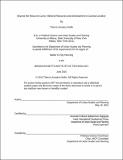Beyond the resource curse : mineral resources and development in Guinea-Conakry
Author(s)
Diallo, Thierno Amadou
DownloadFull printable version (1.393Mb)
Alternative title
Mineral resources and development in Guinea-Conakry
Other Contributors
Massachusetts Institute of Technology. Department of Urban Studies and Planning.
Advisor
Balakrishnan Rajagopal.
Terms of use
Metadata
Show full item recordAbstract
Natural resource endowments are no guarantee of socioeconomic development. Many developing countries are rich in natural resources (minerals, oil, gas, hydropower), and yet many of their citizens remain in poverty and their economies have failed to grow; the "paradox of plenty". Despite its natural resources (bauxite, iron ore, diamond, gold and hydropower), Guinea has been unsuccessful in marshaling and leveraging these resources to produce socioeconomic development. The critical challenge for Guinea, just like many resource-rich countries, is governance failures- decades of military rule, corruption and resource mismanagement after centuries of French colonial rule. This thesis uses secondary sources and data to argue that the resource curse as a phenomenon in resource-rich countries has limitations as it does not offer these countries a path for how their resources could be used to propel social and economic development. To overcome the so-called resource curse, this thesis argues that the key to unlocking economic and social development in mineral-rich Guinea, is investing its resource-generated revenue to develop the country's infrastructure services. Infrastructures such as roads, telecommunications, water, power, education and health facilities are the foundation for socioeconomic development. The new hope for Guinea rests in the fact that after more than fifty two years of military and authoritarian rule, the country transitioned to "democracy" for the first time in 2010. This coupled with the emergence of new global players such as China and other emerging countries, with their quests to secure stable natural resources to fuel their industries, comes a new window of opportunity for resource-rich countries such as Guinea to leverage and link its extractive industries to develop key infrastructure services. Guinea could leverage its bauxite and iron ore industries to transition to onsite transformation of these materials, whose transformation is energy-intensive. Guinea could then leverage the demand for power from the onsite transformation to develop its untapped hydropower generation capacity to supply both mines and the rest of the country. However, this will not happen without governance reforms in Guinea's extractive industries and mining code.
Description
Thesis: M.C.P., Massachusetts Institute of Technology, Department of Urban Studies and Planning, 2015. This electronic version was submitted by the student author. The certified thesis is available in the Institute Archives and Special Collections. Cataloged from student-submitted PDF version of thesis. Includes bibliographical references (pages 73-76).
Date issued
2015Department
Massachusetts Institute of Technology. Department of Urban Studies and PlanningPublisher
Massachusetts Institute of Technology
Keywords
Urban Studies and Planning.